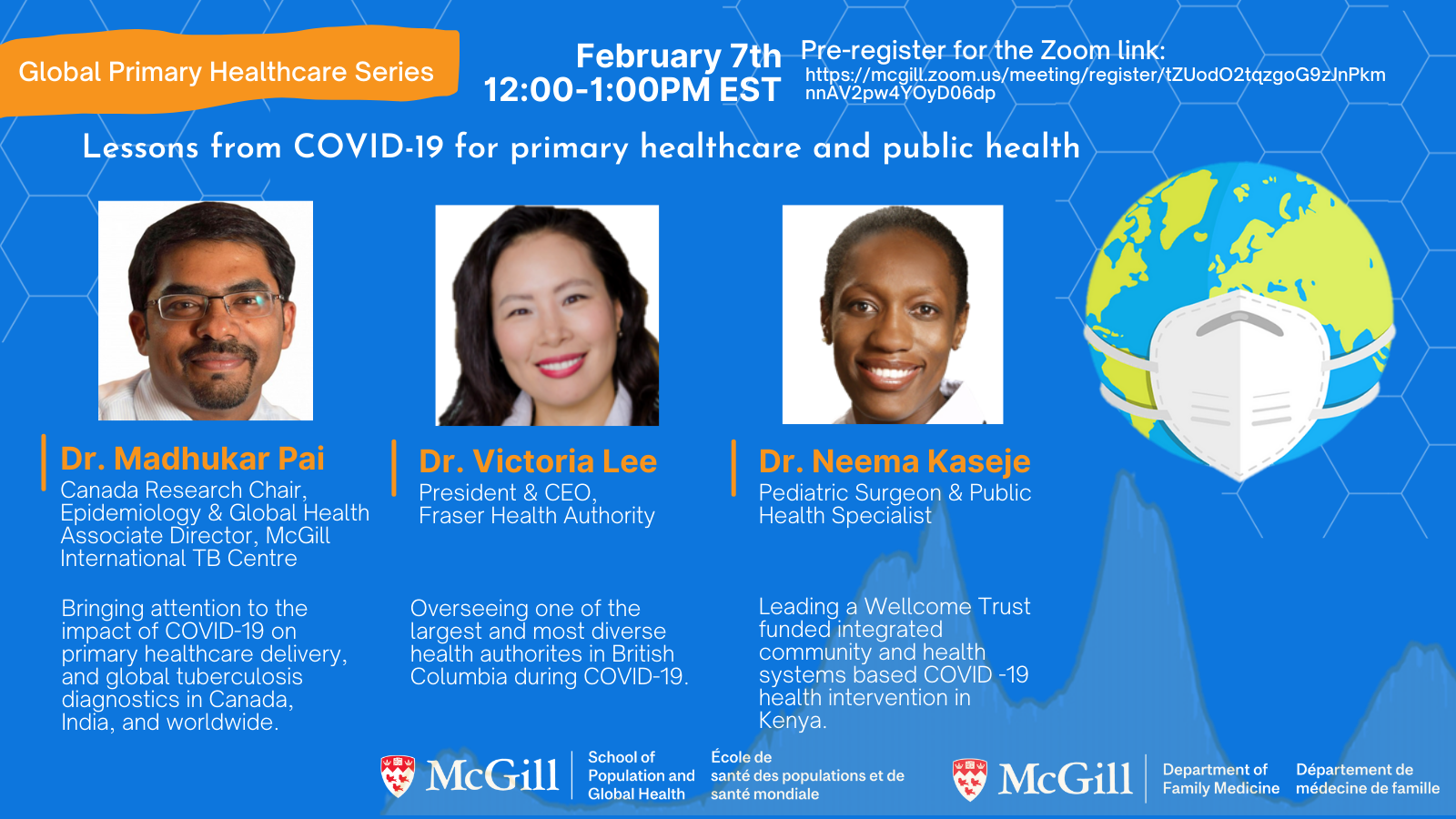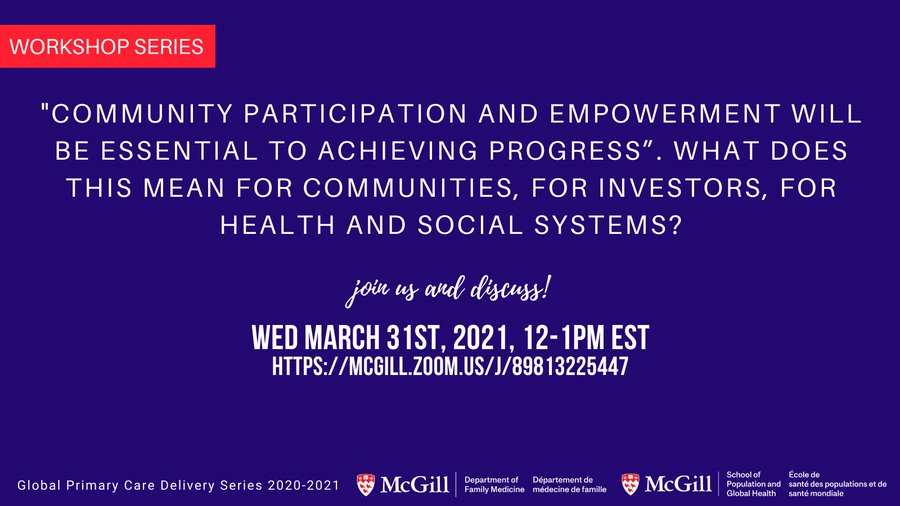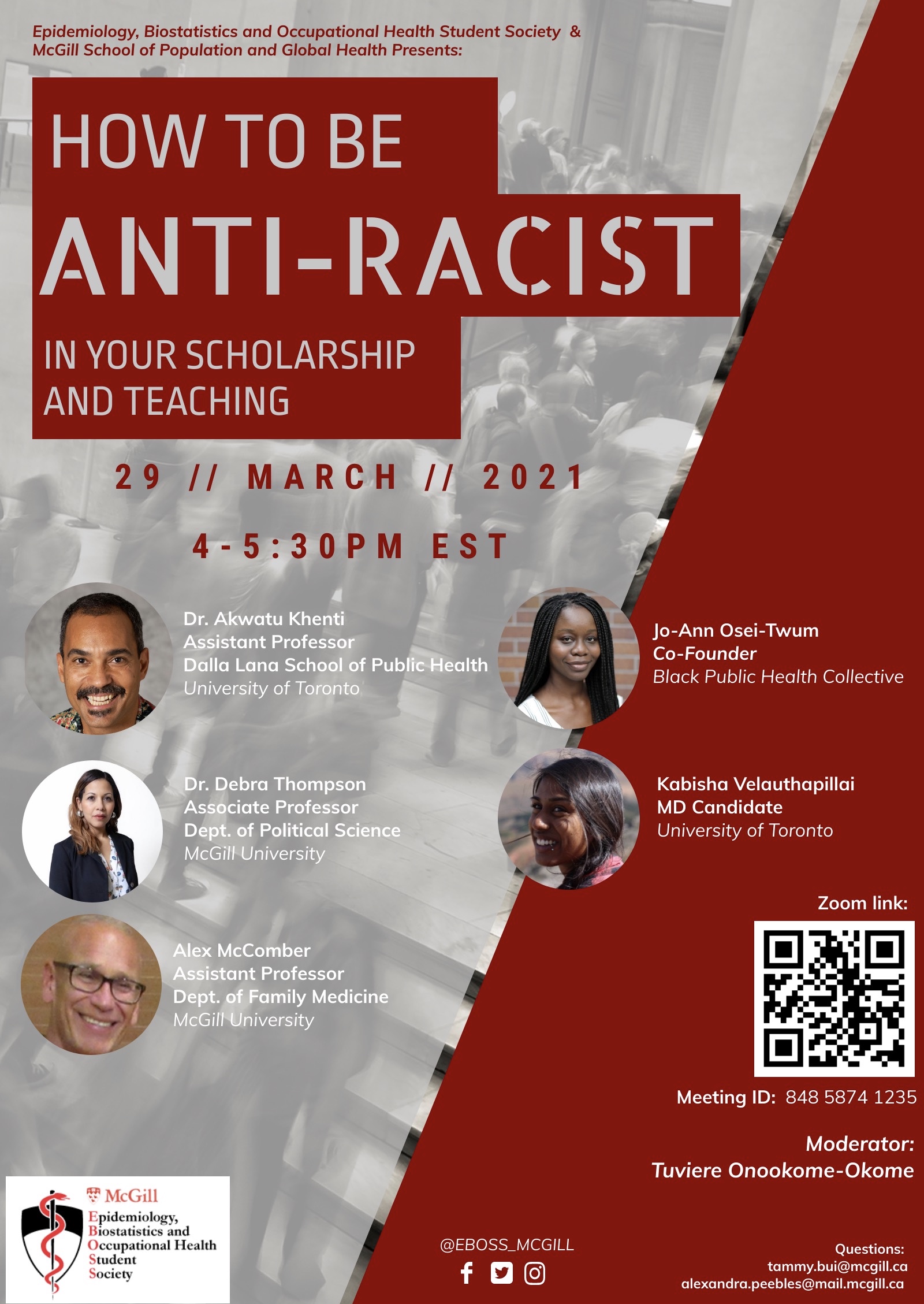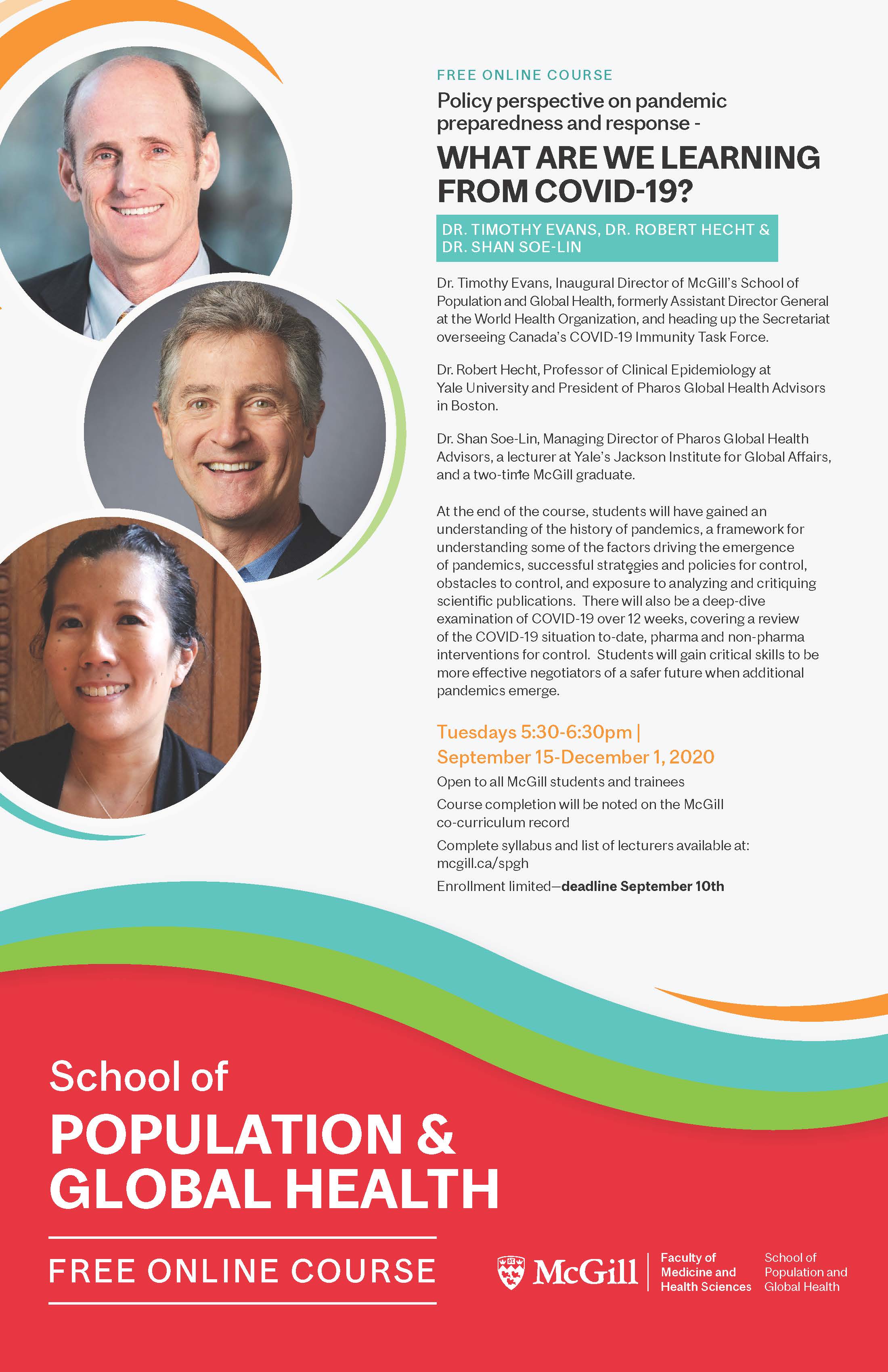2021-2022 events
The McGill University School of Population and Global Health and the McGill Department of Family Medicine present
The Global and Primary Healthcare Webinar Series
Webinar 3: Climate justice and health
Monday March 14, 12:00-1:00 PM EST
Panel speakers:
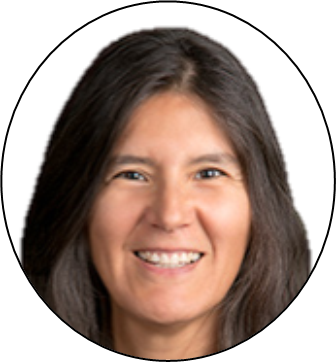 Prof. Deborah McGregor: Associate Professor and Canada Research Chair in Indigenous Environmental Justice at York University. Her research focuses on Indigenous knowledge and legal systems and their applications in contexts including water security, climate justice, and sustainability.
Prof. Deborah McGregor: Associate Professor and Canada Research Chair in Indigenous Environmental Justice at York University. Her research focuses on Indigenous knowledge and legal systems and their applications in contexts including water security, climate justice, and sustainability. Dr. Ingrid Waldron: Professor and HOPE Chair in Peace and Health in the Global Peace and Social Justice Program at McMaster University. Her research, teaching and tireless advocacy focus on the structural and environmental determinants of health and mental health disparities in Black and other communities.
Dr. Ingrid Waldron: Professor and HOPE Chair in Peace and Health in the Global Peace and Social Justice Program at McMaster University. Her research, teaching and tireless advocacy focus on the structural and environmental determinants of health and mental health disparities in Black and other communities.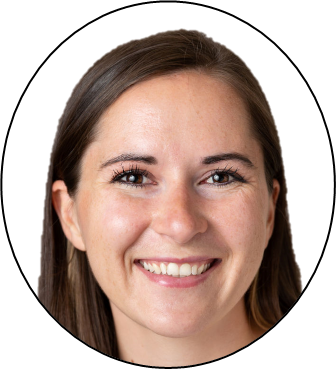 Dr. Claudel Pétrin-Desrosiers: Head of Planetary Health for the Department ofFamily Medicine and Emergency Medicine atthe Université de Montréal. Master's candidate in Environment and Sustainable Development. Since 2018, she chairs the Quebec Association of Physicians for the Environment.
Dr. Claudel Pétrin-Desrosiers: Head of Planetary Health for the Department ofFamily Medicine and Emergency Medicine atthe Université de Montréal. Master's candidate in Environment and Sustainable Development. Since 2018, she chairs the Quebec Association of Physicians for the Environment.
The McGill University School of Population and Global Health and the McGill Department of Family Medicine present
The Global and Primary Healthcare Webinar Series
Webinar 2: Opportunities for primary healthcare reform
Monday February 21, 12:00-1:00 PM EST
Panel speakers:
 Dr. Ak’ingabe Guyon: Assistant Clinical Professor at the École deSanté Publique de l'Université de Montréalalso working with Montreal Public HealthUnit. She is a tireless advocate for reform inQuebec’s public health system and isinterested in the intersection of healthypublic policy and health systems.
Dr. Ak’ingabe Guyon: Assistant Clinical Professor at the École deSanté Publique de l'Université de Montréalalso working with Montreal Public HealthUnit. She is a tireless advocate for reform inQuebec’s public health system and isinterested in the intersection of healthypublic policy and health systems. Dr. Kumanan Rasanathan: Public health physician with over 20 years ofexperience in health systems including his workat the WHO to improve social determinants ofhealth, primary healthcare globally and healthsystems resilience post-Ebola. He is currentlythe Head, Equity and Health Unit, and is leadingthe development of a World Report on SocialDeterminants of Health Equity.
Dr. Kumanan Rasanathan: Public health physician with over 20 years ofexperience in health systems including his workat the WHO to improve social determinants ofhealth, primary healthcare globally and healthsystems resilience post-Ebola. He is currentlythe Head, Equity and Health Unit, and is leadingthe development of a World Report on SocialDeterminants of Health Equity. Professor Jan De Maeseneer: Head of WHO Collaborating Centre for FamilyMedicine and Primary Health Care-GhentUniversity. He also chairs the Expert Panel onEffective Ways of Investing in Health, advising theEuropean Commission. Appointed ProfessorEmeritus at Ghent University, he served asDepartment Chair of Family Medicine and PHCfrom 1991 to 2017.
Professor Jan De Maeseneer: Head of WHO Collaborating Centre for FamilyMedicine and Primary Health Care-GhentUniversity. He also chairs the Expert Panel onEffective Ways of Investing in Health, advising theEuropean Commission. Appointed ProfessorEmeritus at Ghent University, he served asDepartment Chair of Family Medicine and PHCfrom 1991 to 2017.- Moderator: Dr Timothy Evans
The McGill University School of Population and Global Health and the McGill Department of Family Medicine present
The Global and Primary Healthcare Webinar Series
Webinar 1: Lessons from COVID-19 for primary care and public health
Monday, February 7, 2022, 12-1:00 PM EST
Panel speakers:
- Dr. Madhu Pai: Canada Research Chair, Epidemiology & Global Health, Associate Director, McGill International TB Centre
- Dr. Victoria Lee: President & CEO, Fraser Health Authority
- Dr. Neema Kaseje: Pediatric Surgeon & Public Health specialist
- Moderators: Dr Timothy Evans, Dr Marion Dove
The McGill Institute for Health and Social Policy, Biomedical Ethics Unit, and School of Population and Global Health are co-hosting the first IHSP Policy Talks Webinar.
University vaccine mandates: Looking beyond the headlines
September 24, 2021, 12:30-14:00 ET
Watch the recording below
2020-2021 events
In Collaboration with Université de Montréal School of Public Health, McGill University School of Population and Global Health Invites You to a Symposium on Anti-Racism.
Anti-Racism and the Public's Health: Are Universities Stepping Up?
June 23, 2021 – 1 p.m. – 4:30 p.m. EDT

Background
The past year has been challenging, to say the least. Not only has the COVID-19 pandemic illuminated systemic weaknesses in our public health systems, but it has also brought long overdue attention to the health manifestations of systemic racism. In view of the multiple clarions to mobilize, it is important for Schools of Public Health to reflect on their roles and responsibilities with respect to anti-racism and to clarify their plans of action.
Objectives
A convening of Canadian Schools of Public Health to discuss how to address the public health issue that is racism, both within and outside of their walls. The purpose of this event is to generate actionable steps that each School of Public Health can take to advance this issue. By the end of this meeting, we hope to:
- Clarify our role as Schools of Public Health in the fight against racism
- Document the needs of our community and student stakeholders
- Articulate an ambitious anti-racism agenda for Schools of Public Health
Speakers and Moderators
- Jennifer Adams, Associate Professor, University of Calgary
- Ananya Banerjee, Assistant Professor, Department of Epidemiology, Biostatistics and Occupational Health, McGill University
- Stéphanie Bumba, Student, School of Public Health, University of Montreal
- Carrie Bourassa, Professor in the Department of Community Health & Epidemiology at the University of Saskatchewan in Saskatoon, and the Scientific Director of the CIHR Institute of Indigenous Peoples' Health.
- Patrick Cloos, Professor, School of Social Work, School of Public Health, Centre de recherche en santé publique (CReSP), University of Montreal
- Carl-Ardy Dubois, Dean, School of Public Health, University of Montreal
- Mairi Mckenna Edwards, Coordinator, Equity, Diversity and Inclusion Training Student Life, University of Toronto
- Timothy Evans, Director and Associate-Dean, School of Population and Global Health, McGill University
- Olivier Ferlatte, Assistant Professor, Social and Preventative Medicine at the School of Public Health of the University of Montreal
- Hinna Hafeez, Student, School of Population & Global Health, McGill University
- Mira Johri, Professor, School of Public Health, University of Montreal
- Kassandra Kernisan, Executive Director, DESTA Black Youth Network
- Alika Lafontaine, Canadian Medical Association president-elect nominee, Associate Clinical Professor, Faculty of Medicine & Dentistry - Anesthesiology & Pain Medicine
- Gina Ogilvie, Professor, University of British Columbia, School of Public Health
- Saleem Razack, Professor, Pediatrics and Health Sciences Education, McGill University. Director, Office of Social Accountability and Community Engagement, Faculty of Medicine, McGill University
- Amy Tan, Family Physician and Hospice Physician, Clinical Associate Professor, Division of Palliative Care, UBC Faculty of Medicine
- Marjorie Villefranche, Executive Director, Maison D’Haïti
- Bilkis Vissandjée, Professor, School of Nursing, University of Montreal
Agenda
| Time | Description |
|---|---|
| 13:00-13:05 | Opening Remarks and Land Acknowledgement Carl-Ardy Dubois and Timothy Evans |
| 13:05-14:00 | Panel 1: Systemic racism in Canada – what role for universities? Speakers: Jennifer Adams, Patrick Cloos, Alika Lafontaine, Amy Tan and Bilkis Vissandjée Moderators: Carl-Ardy Dubois and Tim Evans |
| 14:00-15:00 | Panel 2: Community and student perspectives on systemic racism: are Schools of Public Health responsive to needs? Speakers: Stéphanie Bumba, Mairi Mckenna Edwards, Hinna Hafeez, Kassandra Kernisan and Marjorie Villefranche Moderators: Ananya Banerjee and Olivier Ferlatte |
| 15:00-15:15 | HEALTH BREAK |
| 15:15-16:15 | Panel 3: Schools of Public Health: Are we part of the solution or part of the problem? Speakers: Carrie Bourassa, Mira Johri and Gina Ogilvie Moderator: Saleem Razack |
| 16:15-16:30 | Closing Remarks & Next Steps Carl-Ardy Dubois and Timothy Evans |
Speaker Biographies/Biographies des Intervenants
 Dr. Jennifer D. Adams is a Tier 2 Canada Research Chair of Creativity and Science and Associate Professor at The University of Calgary where she holds a dual appointment in the Department of Chemistry and Werklund School of Education. Her research focuses on the intersection between creativity and science teaching and learning in postsecondary contexts, more specifically she examines challenges to diversity in science in Canada and the US and how this impedes scientific creativity and innovation. She has scholarly expertise in science teaching and learning in informal science contexts including museums, National Parks and everyday setting. Her scholarship also includes youth learning and identity in informal science contexts, with a focus on underrepresented youth and place/identity in transnational communities and environmental education. She has a Masters in nutrition and has worked with graduate students on urban gardening and food security programs for young people who live in cities. Her work emphasizes critical and sociocultural frameworks and participatory, qualitative, poststructural approaches. Prior to her appointment at the University of Calgary, she was at Brooklyn College and The Graduate Center, City University of New York. She has also worked as a secondary teacher and researcher in NYC public schools and the American Museum of Natural History. Outside of the academy she is a runner and triathlete and has a background in dance and visual art.
Dr. Jennifer D. Adams is a Tier 2 Canada Research Chair of Creativity and Science and Associate Professor at The University of Calgary where she holds a dual appointment in the Department of Chemistry and Werklund School of Education. Her research focuses on the intersection between creativity and science teaching and learning in postsecondary contexts, more specifically she examines challenges to diversity in science in Canada and the US and how this impedes scientific creativity and innovation. She has scholarly expertise in science teaching and learning in informal science contexts including museums, National Parks and everyday setting. Her scholarship also includes youth learning and identity in informal science contexts, with a focus on underrepresented youth and place/identity in transnational communities and environmental education. She has a Masters in nutrition and has worked with graduate students on urban gardening and food security programs for young people who live in cities. Her work emphasizes critical and sociocultural frameworks and participatory, qualitative, poststructural approaches. Prior to her appointment at the University of Calgary, she was at Brooklyn College and The Graduate Center, City University of New York. She has also worked as a secondary teacher and researcher in NYC public schools and the American Museum of Natural History. Outside of the academy she is a runner and triathlete and has a background in dance and visual art.
 Dr. Ananya Tina Banerjee is Assistant Professor at the School of Global and Population Health (SGPH), McGill University. Her interdisciplinary research embeds a strong emphasis on community-based participatory pedagogy and research, which is grounded in collaboration and partnership with her racialized students and their communities. Often, the research questions she pursues are community-defined problems in the context of health equity using mixed-methods funded by the Social Science & Humanities Research Council and Public Health Agency of Canada. She created and developed the first course on race and health in a school of public health in Canada. She is well known for her anti-racism and anti-oppression practice in the learning environment and providing critical mentorship for racialized students in public health programs.
Dr. Ananya Tina Banerjee is Assistant Professor at the School of Global and Population Health (SGPH), McGill University. Her interdisciplinary research embeds a strong emphasis on community-based participatory pedagogy and research, which is grounded in collaboration and partnership with her racialized students and their communities. Often, the research questions she pursues are community-defined problems in the context of health equity using mixed-methods funded by the Social Science & Humanities Research Council and Public Health Agency of Canada. She created and developed the first course on race and health in a school of public health in Canada. She is well known for her anti-racism and anti-oppression practice in the learning environment and providing critical mentorship for racialized students in public health programs.
 Stéphanie Bumba est une infirmière clinicienne et une candidate à la maitrise en administration des services de santé à l’École de santé publique de l’Université de Montréal. Je suis également la créatrice d’une web-série, qui s’intitule « Ces afroscientifiques d’hier à aujourd’hui », sur ma chaine YouTube « Nurse Stephie TV. Le but de ce projet est de faire rayonner différents afrodescendants qui ont été des pionniers dans l’avancement des différents domaines scientifiques.
Stéphanie Bumba est une infirmière clinicienne et une candidate à la maitrise en administration des services de santé à l’École de santé publique de l’Université de Montréal. Je suis également la créatrice d’une web-série, qui s’intitule « Ces afroscientifiques d’hier à aujourd’hui », sur ma chaine YouTube « Nurse Stephie TV. Le but de ce projet est de faire rayonner différents afrodescendants qui ont été des pionniers dans l’avancement des différents domaines scientifiques.
 Dr. Carrie Bourassa, B.A., M.A., PhD is the Scientific Director of the Canadian Institutes of Health Research – Institute of Indigenous Peoples’ Health (CIHR-IIPH) and a Professor, Community Health & Epidemiology, University of Saskatchewan. She is the Principal Investigator for the Canada Foundation for Innovation funded Morning Star Lodge as well as the Cultural Safety, Evaluation, Training and Research lab. Dr. Bourassa has nearly 20 years’ experience as a professor in the field of Indigenous health studies. Through her role as Scientific Director of IIPH, she leads the advancement of a national health research agenda to improve and promote the health of First Nations, Inuit and Métis Peoples in Canada.
Dr. Carrie Bourassa, B.A., M.A., PhD is the Scientific Director of the Canadian Institutes of Health Research – Institute of Indigenous Peoples’ Health (CIHR-IIPH) and a Professor, Community Health & Epidemiology, University of Saskatchewan. She is the Principal Investigator for the Canada Foundation for Innovation funded Morning Star Lodge as well as the Cultural Safety, Evaluation, Training and Research lab. Dr. Bourassa has nearly 20 years’ experience as a professor in the field of Indigenous health studies. Through her role as Scientific Director of IIPH, she leads the advancement of a national health research agenda to improve and promote the health of First Nations, Inuit and Métis Peoples in Canada.
Dr. Patrick Cloos est professeur en sciences sociales et en santé publique, Université de Montréal. Avant cela, PC a pratiqué la médecine d’urgence en milieux hospitalier et humanitaire dans plusieurs régions du monde, et a été directeur de la santé publique à la Dominique dans les Antilles. Sa thèse de doctorat a porté sur la racialisation de la Santé Publique américaine (Université de Montréal, 2010). PC est actuellement impliqué dans plusieurs études en santé mondiale, dans le domaine de la santé et des migrations internationales, et, depuis plus récemment, du changement climatique. PC a publié «Pouvoirs, différence et stéréotypes. Regard socio-anthropologique sur la santé publique américaine» (PUL, 2015), et des articles en français et en anglais sur les liens entre racisme, racialisation et l’idée de race.
 Dr. Carl-Ardy Dubois a une formation pluridisciplinaire et a d’abord complété un doctorat en médecine et des études de premier et deuxième cycles en épidémiologie, biostatistiques et administration des services de santé. Il a ensuite obtenu un doctorat en santé publique de l’Université de Montréal. Il a effectué ses études postdoctorales au Royaume-Uni, à la London School of Hygiene and Tropical Medicine, dans le cadre d’une collaboration avec l’Observatoire européen des systèmes et des politiques de santé. Il est actuellement doyen de l’École de santé publique de l’Université de Montréal (ESPUM). Avant de joindre l’ESPUM, Dr Dubois a été professeur à la Faculté des sciences infirmières de l’UdeM où il a occupé plusieurs postes de leadership scientifique. Il a été directeur scientifique du Centre FERASI (Centre de formation et d’expertise en recherche en administration des services infirmiers) et a copiloté le développement et la mise en place du Réseau de recherche en interventions en sciences infirmières du Québec (RRISIQ). Actuellement chercheur au Centre de recherche en santé publique (CReSP), il est aussi rattaché au Centre interuniversitaire de recherche en analyse des organisations (CIRANO), au Centre de recherche Interactions du CIUSSS du Nord-de-l’Île-de-Montréal et au RRISIQ.
Dr. Carl-Ardy Dubois a une formation pluridisciplinaire et a d’abord complété un doctorat en médecine et des études de premier et deuxième cycles en épidémiologie, biostatistiques et administration des services de santé. Il a ensuite obtenu un doctorat en santé publique de l’Université de Montréal. Il a effectué ses études postdoctorales au Royaume-Uni, à la London School of Hygiene and Tropical Medicine, dans le cadre d’une collaboration avec l’Observatoire européen des systèmes et des politiques de santé. Il est actuellement doyen de l’École de santé publique de l’Université de Montréal (ESPUM). Avant de joindre l’ESPUM, Dr Dubois a été professeur à la Faculté des sciences infirmières de l’UdeM où il a occupé plusieurs postes de leadership scientifique. Il a été directeur scientifique du Centre FERASI (Centre de formation et d’expertise en recherche en administration des services infirmiers) et a copiloté le développement et la mise en place du Réseau de recherche en interventions en sciences infirmières du Québec (RRISIQ). Actuellement chercheur au Centre de recherche en santé publique (CReSP), il est aussi rattaché au Centre interuniversitaire de recherche en analyse des organisations (CIRANO), au Centre de recherche Interactions du CIUSSS du Nord-de-l’Île-de-Montréal et au RRISIQ.
 Mairi Mckenna Edwards is both a consultant in Ontario and the Coordinator of Diversity & Inclusion Training in Student Life at the University of Toronto. Máiri (Mar-ee) brings hope to difficult conversations with an appreciation for levity and play to keep in mind that at the of heart of this work is increasing the connections between us. Her work draws on her own lessons coming from a mix of ethnoracial identities (Jamaican and Irish) to recognize both the commonalities between us as well as the particularities of our different experiences in the world. Máiri has worked in and run community based programs for children, youth and families in the Toronto area; taught and managed programs in higher education; and been a private consultant. She predominantly focuses on anti-oppressive principles, anti-racism, practicing solidarity with other communities and prioritizing the development of relationships. Her favourite pass time is good conversation, especially with the kids, while eating the amazing creations made by her hubby on the BBQ.
Mairi Mckenna Edwards is both a consultant in Ontario and the Coordinator of Diversity & Inclusion Training in Student Life at the University of Toronto. Máiri (Mar-ee) brings hope to difficult conversations with an appreciation for levity and play to keep in mind that at the of heart of this work is increasing the connections between us. Her work draws on her own lessons coming from a mix of ethnoracial identities (Jamaican and Irish) to recognize both the commonalities between us as well as the particularities of our different experiences in the world. Máiri has worked in and run community based programs for children, youth and families in the Toronto area; taught and managed programs in higher education; and been a private consultant. She predominantly focuses on anti-oppressive principles, anti-racism, practicing solidarity with other communities and prioritizing the development of relationships. Her favourite pass time is good conversation, especially with the kids, while eating the amazing creations made by her hubby on the BBQ.
 Dr. Timothy Evans, MD, DPhil is the Associate Dean and Director of McGill’s School of Population and Global Health in the Faculty of Medicine. Since joining McGill, and in the context of the COVID-19 Pandemic, he was named as the Executive Director of Canada’s COVID-19 Immunity Task Force in April 2020. Prior to McGill, he spent 6 years as the Senior Director of the Health, Nutrition and Population Global Practice at the World Bank Group. Dr. Evans has been at the forefront of advancing global health equity and strengthening health systems delivery for more than 20 years. At WHO, he led the Commission on Social Determinants of Health and oversaw the production of the annual World Health Report. He has been a co-founder of many partnerships, including the Global Alliance on Vaccines and Immunization (GAVI), as well as efforts to increase access to HIV treatment for mothers and innovative approaches to training community-based midwives in Bangladesh.
Dr. Timothy Evans, MD, DPhil is the Associate Dean and Director of McGill’s School of Population and Global Health in the Faculty of Medicine. Since joining McGill, and in the context of the COVID-19 Pandemic, he was named as the Executive Director of Canada’s COVID-19 Immunity Task Force in April 2020. Prior to McGill, he spent 6 years as the Senior Director of the Health, Nutrition and Population Global Practice at the World Bank Group. Dr. Evans has been at the forefront of advancing global health equity and strengthening health systems delivery for more than 20 years. At WHO, he led the Commission on Social Determinants of Health and oversaw the production of the annual World Health Report. He has been a co-founder of many partnerships, including the Global Alliance on Vaccines and Immunization (GAVI), as well as efforts to increase access to HIV treatment for mothers and innovative approaches to training community-based midwives in Bangladesh.
 Dr. Olivier Ferlatte est professeur adjoint à l’École de santé publique de l’Université de Montréal et chercheur régulier au Centre de recherche en santé publique (CReSP). Son programme de recherche porte sur les déterminants sociaux de la santé mentale des populations LGBTQ2S+.
Dr. Olivier Ferlatte est professeur adjoint à l’École de santé publique de l’Université de Montréal et chercheur régulier au Centre de recherche en santé publique (CReSP). Son programme de recherche porte sur les déterminants sociaux de la santé mentale des populations LGBTQ2S+.
 Hinna Hafeez is a Master of Science in Public Health student at McGill University and a Kashmiri settler on Turtle Island. She has spent many years advocating for the importance of mental health on post-secondary campuses and its intersection with race by working to address mental health stigma in South Asian communities. She is currently working with the South Asian Allyship Network to educate others on anti-Black racism, anti-Indigeneity, and other forms of systemic oppression.
Hinna Hafeez is a Master of Science in Public Health student at McGill University and a Kashmiri settler on Turtle Island. She has spent many years advocating for the importance of mental health on post-secondary campuses and its intersection with race by working to address mental health stigma in South Asian communities. She is currently working with the South Asian Allyship Network to educate others on anti-Black racism, anti-Indigeneity, and other forms of systemic oppression.
 Dr. Mira Johri, PhD MPH est professeure au département de gestion, d'évaluation et de politique de la santé de l'École de santé publique de l'Université de Montréal et chercheure régulière au Centre de recherche de l'Hôpital de l'Université de Montréal (CRCHUM). Les recherches du Dre Johri visent à mieux comprendre les déterminants sociaux et structurels de la santé infantile mondiale et à identifier des approches innovantes pour relever les principaux défis limitant le potentiel des enfants. La Dre Johri a étudié l'économie, l'éthique et la philosophie politique à l'Université McGill, et la santé publique à l'Université Yale. Elle a été consultante au département de la santé de la mère, du nouveau-né, de l'enfant et de l'adolescent de l'Organisation mondiale de la santé et est actuellement experte indépendante auprès de Gavi, l'Alliance pour les vaccins, et commissaire de la commission Lancet sur la perte auditive. Ses recherches ont été publiées dans des revues à fort impact telles que le Lancet, BMC Medicine et le Bulletin de l'Organisation mondiale de la santé. Mira s'intéresse particulièrement à la recherche communautaire et au potentiel des technologies appropriées intégrées dans les processus communautaires pour améliorer les résultats en matière de santé et de développement. Les recherches de Dre Johri portent sur l'accès équitable aux vaccins pour enfants dans le monde et en Inde, où elle dirige des recherches de terrain depuis 2012.
Dr. Mira Johri, PhD MPH est professeure au département de gestion, d'évaluation et de politique de la santé de l'École de santé publique de l'Université de Montréal et chercheure régulière au Centre de recherche de l'Hôpital de l'Université de Montréal (CRCHUM). Les recherches du Dre Johri visent à mieux comprendre les déterminants sociaux et structurels de la santé infantile mondiale et à identifier des approches innovantes pour relever les principaux défis limitant le potentiel des enfants. La Dre Johri a étudié l'économie, l'éthique et la philosophie politique à l'Université McGill, et la santé publique à l'Université Yale. Elle a été consultante au département de la santé de la mère, du nouveau-né, de l'enfant et de l'adolescent de l'Organisation mondiale de la santé et est actuellement experte indépendante auprès de Gavi, l'Alliance pour les vaccins, et commissaire de la commission Lancet sur la perte auditive. Ses recherches ont été publiées dans des revues à fort impact telles que le Lancet, BMC Medicine et le Bulletin de l'Organisation mondiale de la santé. Mira s'intéresse particulièrement à la recherche communautaire et au potentiel des technologies appropriées intégrées dans les processus communautaires pour améliorer les résultats en matière de santé et de développement. Les recherches de Dre Johri portent sur l'accès équitable aux vaccins pour enfants dans le monde et en Inde, où elle dirige des recherches de terrain depuis 2012.
 Kassandra Kernisan holds an MBA from HEC Montreal, one of Canada’s leading Business Schools. She also holds a Bachelor of Commerce from McGill University with a specialization in marketing. She has 15+ years of experience in corporate marketing, business management and entrepreneurship. Kassandra is also a wellness advocate promoting health empowerment with a particular mission to offer wellness education and resources to marginalized groups. She is the founder of Alkemy Wellness, a movement to guide others towards the roots of holistic health, spiritual elevation and transformation. She is also the founder and creator of Herb ‘n Beauty Natural Cosmetics, a line of 100% natural, herb-infused skin and hair-care products, aromatherapy products and healing herbs. She is currently the Executive Director at DESTA Black Youth Network, a non-profit organization empowering Black youth between the ages of 18-35 to reach their educational, employability and entrepreneurial goals.
Kassandra Kernisan holds an MBA from HEC Montreal, one of Canada’s leading Business Schools. She also holds a Bachelor of Commerce from McGill University with a specialization in marketing. She has 15+ years of experience in corporate marketing, business management and entrepreneurship. Kassandra is also a wellness advocate promoting health empowerment with a particular mission to offer wellness education and resources to marginalized groups. She is the founder of Alkemy Wellness, a movement to guide others towards the roots of holistic health, spiritual elevation and transformation. She is also the founder and creator of Herb ‘n Beauty Natural Cosmetics, a line of 100% natural, herb-infused skin and hair-care products, aromatherapy products and healing herbs. She is currently the Executive Director at DESTA Black Youth Network, a non-profit organization empowering Black youth between the ages of 18-35 to reach their educational, employability and entrepreneurial goals.
 Dr. Alika Lafontaine is an award-winning Indigenous physician of Metis, Cree, Anishinaabe, and Pacific Islander ancestry. He has received numerous awards and honors, is past-President of the Indigenous Physicians Association of Canada and is the first Indigenous physician listed by the Medical Post as one of Canada’s 50 Most Powerful Doctors. In Fall 2021, he will become the first physician of Indigenous and Pacific Islander ancestry to serve as President-elect of the Canadian Medical Association in its 154-year history. In 2020 Alika co-founded Safespace Networks, a learning system for reporting experiences of harm in health systems. In 2021, Safespace Networks and the BC Association of Aboriginal Friendship Centres (BCAAFC) partnered to launch an anonymous network in BC focused on experiences of racialized harm within BC health systems; both patients and providers can report first-hand and observed harm. For four years, Alika co-led the Indigenous Health Alliance project, one of the most ambitious Indigenous health transformation initiatives in Canadian history, which at its peak involved political Indigenous leadership representing more than 150 First Nations across three Provinces. In 2018, the federal government allocated $68 million in funding to the Indigenous Territories involved in the project. Dr. Lafontaine holds leadership positions within the Alberta Medical Association, Canadian Medical Association, HealthCareCAN, the Royal College of Physicians and Surgeons of Canada, and Alberta Health Services where he influences clinician practice, patient advocacy, health systems operation, and development of health policy. He also chairs the governance council of the Canadian Medical Association Journal. Dr. Lafontaine continues to practice clinically as an Anesthesiologist and is an Associate Clinical Professor in the Department of Anesthesiology and Pain Medicine, University of Alberta.
Dr. Alika Lafontaine is an award-winning Indigenous physician of Metis, Cree, Anishinaabe, and Pacific Islander ancestry. He has received numerous awards and honors, is past-President of the Indigenous Physicians Association of Canada and is the first Indigenous physician listed by the Medical Post as one of Canada’s 50 Most Powerful Doctors. In Fall 2021, he will become the first physician of Indigenous and Pacific Islander ancestry to serve as President-elect of the Canadian Medical Association in its 154-year history. In 2020 Alika co-founded Safespace Networks, a learning system for reporting experiences of harm in health systems. In 2021, Safespace Networks and the BC Association of Aboriginal Friendship Centres (BCAAFC) partnered to launch an anonymous network in BC focused on experiences of racialized harm within BC health systems; both patients and providers can report first-hand and observed harm. For four years, Alika co-led the Indigenous Health Alliance project, one of the most ambitious Indigenous health transformation initiatives in Canadian history, which at its peak involved political Indigenous leadership representing more than 150 First Nations across three Provinces. In 2018, the federal government allocated $68 million in funding to the Indigenous Territories involved in the project. Dr. Lafontaine holds leadership positions within the Alberta Medical Association, Canadian Medical Association, HealthCareCAN, the Royal College of Physicians and Surgeons of Canada, and Alberta Health Services where he influences clinician practice, patient advocacy, health systems operation, and development of health policy. He also chairs the governance council of the Canadian Medical Association Journal. Dr. Lafontaine continues to practice clinically as an Anesthesiologist and is an Associate Clinical Professor in the Department of Anesthesiology and Pain Medicine, University of Alberta.
 Dr. Gina Ogilvie, MD MSc FCFP DrPH is a Tier 1 Canada Research Chair in Global Control of HPV related diseases and prevention, and Professor at the University of British Columbia in the School of Population and Public Health. She is also Senior Public Health Scientist at BC Centre for Disease Control and Senior Research Advisor at the BC Women’s Hospital and Health Centre. She was previously Medical Director of Clinical Prevention Services at BC Centre for Disease Control where she provided both operational and scientific leadership to an integrated public health unit with over 100 staff. Her research is focused on both the public health and clinical aspects of reproductive health, sexually transmitted infections, HPV screening and the HPV vaccine, and her findings have been highly influential in setting and directing health policy both in Canada and globally. She has published over 200 peer reviewed manuscripts and has provided advice and consultation to national and global institutions, including the Canadian Partnership Against Cancer, Public Health Agency of Canada, the World Health Organization and Ministries of Health globally on STI, HIV and HPV vaccine policy and programming. Dr. Ogilvie received her MD from McMaster University, and completed a specialty in Family Medicine and a fellowship in Population Health and Primary care. She received her Master of Science at UBC, and her Doctorate in Public Health from the University of North Carolina Gillings School of Global Public Health.
Dr. Gina Ogilvie, MD MSc FCFP DrPH is a Tier 1 Canada Research Chair in Global Control of HPV related diseases and prevention, and Professor at the University of British Columbia in the School of Population and Public Health. She is also Senior Public Health Scientist at BC Centre for Disease Control and Senior Research Advisor at the BC Women’s Hospital and Health Centre. She was previously Medical Director of Clinical Prevention Services at BC Centre for Disease Control where she provided both operational and scientific leadership to an integrated public health unit with over 100 staff. Her research is focused on both the public health and clinical aspects of reproductive health, sexually transmitted infections, HPV screening and the HPV vaccine, and her findings have been highly influential in setting and directing health policy both in Canada and globally. She has published over 200 peer reviewed manuscripts and has provided advice and consultation to national and global institutions, including the Canadian Partnership Against Cancer, Public Health Agency of Canada, the World Health Organization and Ministries of Health globally on STI, HIV and HPV vaccine policy and programming. Dr. Ogilvie received her MD from McMaster University, and completed a specialty in Family Medicine and a fellowship in Population Health and Primary care. She received her Master of Science at UBC, and her Doctorate in Public Health from the University of North Carolina Gillings School of Global Public Health.
 Dr. Saleem Razack is a professor of pediatrics and health sciences education at McGill University. He is the director of the Office of Social Accountability and Community Engagement within the Faculty of Medicine at McGill and Division Director for the Pediatric Critical Care Medicine at Montreal Children’s Hospital. His research interests are within equity, diversity, and inclusion in health professions education.
Dr. Saleem Razack is a professor of pediatrics and health sciences education at McGill University. He is the director of the Office of Social Accountability and Community Engagement within the Faculty of Medicine at McGill and Division Director for the Pediatric Critical Care Medicine at Montreal Children’s Hospital. His research interests are within equity, diversity, and inclusion in health professions education.
 Marjorie Villefranche est directrice générale de la Maison d’Haïti. Elle occupe l’avant plan de l’actualité par son implication dans la lutte contre le racisme et la discrimination, l’énergie qu’elle met à faire avancer les dossiers des femmes immigrantes et des sans papier est sans faille. Spécialiste de l’histoire de la communauté haïtienne, elle a participé en 2014 au projet Histoires d’immigrations mené par l’UQAM et la Bibliothèque et archives nationales du Québec. Honorée par plusieurs prix dont, Citoyenne d’honneur de la ville de Montréal en 2021, Bâtisseuse de la cité en 2017. Personnalité de la semaine, La Presse, Radio-Canada en 2012, Femme de mérite, catégorie Éducation de la Fondation du YWCA, 2008. Marjorie Villefranche est actuellement une des voix les plus influentes de son milieu.
Marjorie Villefranche est directrice générale de la Maison d’Haïti. Elle occupe l’avant plan de l’actualité par son implication dans la lutte contre le racisme et la discrimination, l’énergie qu’elle met à faire avancer les dossiers des femmes immigrantes et des sans papier est sans faille. Spécialiste de l’histoire de la communauté haïtienne, elle a participé en 2014 au projet Histoires d’immigrations mené par l’UQAM et la Bibliothèque et archives nationales du Québec. Honorée par plusieurs prix dont, Citoyenne d’honneur de la ville de Montréal en 2021, Bâtisseuse de la cité en 2017. Personnalité de la semaine, La Presse, Radio-Canada en 2012, Femme de mérite, catégorie Éducation de la Fondation du YWCA, 2008. Marjorie Villefranche est actuellement une des voix les plus influentes de son milieu.
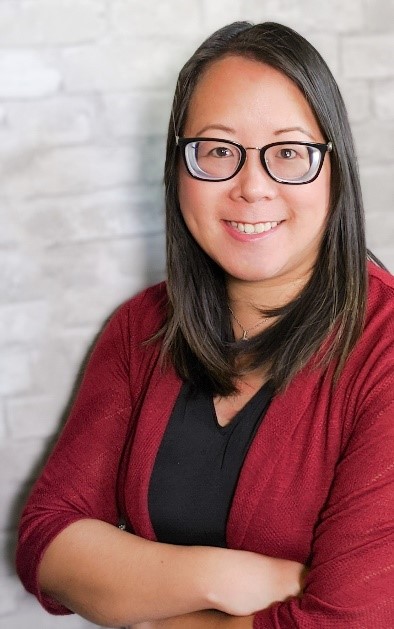 Dr Amy Tan, MD MSc (Pall Med) CCFP(PC) FCFP, is a Clinical Associate Professor in the Division of Palliative Care at the UBC Faculty of Medicine, Adjunct Associate Professor (Research) in the Dept of Family Medicine, University of Calgary, and a palliative care and family physician in Victoria, BC. She is also Medical Director for Victoria Hospice and a researcher in ethical decision-making, culturally-safe communication with patients and advance care planning. Dr. Tan is an advocate for health equity and an anti-racism educator and consultant. She has been speaking out about the intersection of systemic racism and COVID-19 since the beginning of the pandemic and while advocating for equitable public health policies to combat the pandemic, is committed to ongoing work towards solutions for the structural inequities that COVID-19 is laying bare in Canada.
Dr Amy Tan, MD MSc (Pall Med) CCFP(PC) FCFP, is a Clinical Associate Professor in the Division of Palliative Care at the UBC Faculty of Medicine, Adjunct Associate Professor (Research) in the Dept of Family Medicine, University of Calgary, and a palliative care and family physician in Victoria, BC. She is also Medical Director for Victoria Hospice and a researcher in ethical decision-making, culturally-safe communication with patients and advance care planning. Dr. Tan is an advocate for health equity and an anti-racism educator and consultant. She has been speaking out about the intersection of systemic racism and COVID-19 since the beginning of the pandemic and while advocating for equitable public health policies to combat the pandemic, is committed to ongoing work towards solutions for the structural inequities that COVID-19 is laying bare in Canada.
 Dr. Bilkis Vissandjée est professeure titulaire à la Faculté des sciences infirmières de l'Université, chercheuse à l'Institut de recherche en santé publique de l'Université de Montréal (IRSPUM), ainsi qu'au Centre de recherche et de formation du CSSS de la Montagne. (Équipe Migration, Ethnicité, Services sociaux et de santé, MÉTISS), dont elle est une des cofondatrices. Elle est également membre du groupe The Tuberculosis Montreal Interdisciplinary Research Team. Son principal intérêt en recherche réside dans les défis que pose la prestation de soins de qualité dans un contexte multiethnique, selon une perspective tenant compte du genre, de l’appartenance ethnique, des expériences d’immigration et de l’équité. Parmi ses actions reliées aux questions sur le sexe, le genre et la migration, elle a contribué, en collaboration avec diverses ONG, à l’élaboration et l’implantation de programmes destinés aux nouveaux arrivants au Canada présentant des conditions comme la tuberculose et le diabète de type 2, et adaptés à leur contexte. Ses contributions au milieu scientifique, en collaboration avec des partenaires nationaux et internationaux, font ressortir l’importance des questions reliés au genre, à l’expérience de la migration et à l’ethnicité dans l’élaboration de stratégies visant à promouvoir la santé dans un contexte socioculturel diversifié.
Dr. Bilkis Vissandjée est professeure titulaire à la Faculté des sciences infirmières de l'Université, chercheuse à l'Institut de recherche en santé publique de l'Université de Montréal (IRSPUM), ainsi qu'au Centre de recherche et de formation du CSSS de la Montagne. (Équipe Migration, Ethnicité, Services sociaux et de santé, MÉTISS), dont elle est une des cofondatrices. Elle est également membre du groupe The Tuberculosis Montreal Interdisciplinary Research Team. Son principal intérêt en recherche réside dans les défis que pose la prestation de soins de qualité dans un contexte multiethnique, selon une perspective tenant compte du genre, de l’appartenance ethnique, des expériences d’immigration et de l’équité. Parmi ses actions reliées aux questions sur le sexe, le genre et la migration, elle a contribué, en collaboration avec diverses ONG, à l’élaboration et l’implantation de programmes destinés aux nouveaux arrivants au Canada présentant des conditions comme la tuberculose et le diabète de type 2, et adaptés à leur contexte. Ses contributions au milieu scientifique, en collaboration avec des partenaires nationaux et internationaux, font ressortir l’importance des questions reliés au genre, à l’expérience de la migration et à l’ethnicité dans l’élaboration de stratégies visant à promouvoir la santé dans un contexte socioculturel diversifié.
The McGill University School of Population and Global Health and the McGill Department of Family Medicine present:
The Global Primary Care Delivery Workshop Series
Workshop #6
Topic: "How can primary healthcare systems deliver care to the aging population?"
Wednesday, June 9, 2021, 12-1 PM EDT
Readings:
- Example case study "Age in Place"
- Telemedicine and primary care obesity management in rural areas – innovative approach for older adults?
Optional reading:
Discussion questions:
- What are the limits and benefits of technology when providing PHC services for elderly patients, such as the "Age in Place" case study? What the unique implications of this technology in low-resource settings in Canada or globally?
- When imagining/designing new PHC delivery models, how should primary healthcare providers collaborate with families/informal caregivers to better tailor services to meet the needs of elderly patients?
- Any general reflections on the GPC Workshop Series as a whole? What lessons have you learned? How do you see these ideas evolving into action?
The McGill University School of Population and Global Health and the McGill Department of Family Medicine present:
The Global Primary Care Delivery Webinar Series
In January, the Department of Family Medicine launched a series of monthly workshops and invited speakers around the theme of Global Primary Care Delivery in collaboration with the School of Population and Global Health.
Session 6: Health justice and quality of care
Wednesday, June 2, 2021, 12:00 to 1:00 p.m. EDT
According to the WHO (2018), "PHC is rooted in a commitment to social justice, equity and participation." Drs. Lynda Redwood-Campbell and Sabina Faiz Rashid will reflect on the adaptability of PHC models to fulfill this aspiration by drawing upon their experiences in working with and listening to underserved populations in the context of humanitarian crises and ethnographic research. How can PHC services can be delivered and scaled up to respond to the health and development needs of people in precarious or emergency settings, all while ensuring equity in accessibility and quality? How can we reimagine and build more resilient health systems in people-centred, context-specific and sustainable ways? Join us as we discuss lessons learned and innovative examples of PHC delivery models around the world.
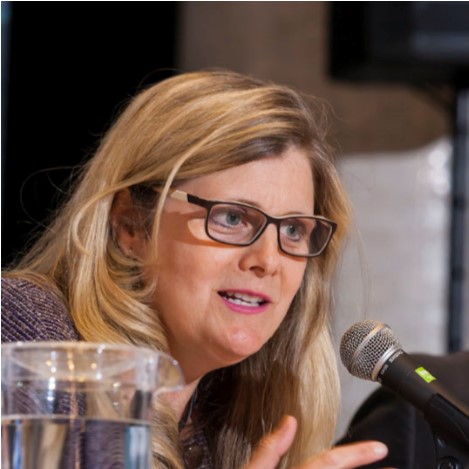 Dr. Lynda Redwood-Campbell MD, FCFP, DTM&H, MPH is a family physician with research, scholarly and international expertise in global health, immigrant/refugee health and humanitarian response. Her interest is how to integrate PHC into disaster preparedness/response in policy and action. She has worked in many resource-poor countries and as part of several emergency responses including with the ICRC Red Cross field hospital in Indonesia after the December 2004 Tsunami and the Kashmir 2005 earthquake in Pakistan, the 2010 Haiti earthquake and cholera outbreak. She continues to lead global capacity-building initiatives focused on health human resources and primary care delivery. She has also chaired the global health committee of the Canadian College of Family Physicians and served on various international editorial boards including the Prehospital and Disaster Medicine Journal.
Dr. Lynda Redwood-Campbell MD, FCFP, DTM&H, MPH is a family physician with research, scholarly and international expertise in global health, immigrant/refugee health and humanitarian response. Her interest is how to integrate PHC into disaster preparedness/response in policy and action. She has worked in many resource-poor countries and as part of several emergency responses including with the ICRC Red Cross field hospital in Indonesia after the December 2004 Tsunami and the Kashmir 2005 earthquake in Pakistan, the 2010 Haiti earthquake and cholera outbreak. She continues to lead global capacity-building initiatives focused on health human resources and primary care delivery. She has also chaired the global health committee of the Canadian College of Family Physicians and served on various international editorial boards including the Prehospital and Disaster Medicine Journal.
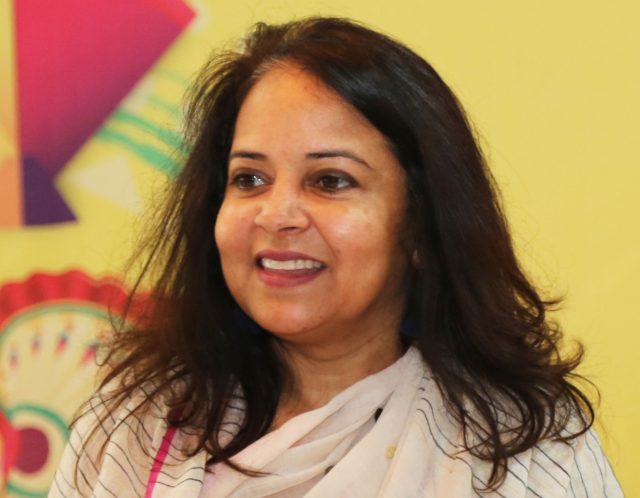 Dr. Sabina Faiz Rashid PhD is Dean & Professor at BRAC James P Grant School of Public Health, BRAC University. She specializes in ethnographic and qualitative research that explores the impact of structural and intersectional factors on the ability of marginalized populations (i.e. sexual minorities, refugee populations, adolescents, slum dwellers) to realize their sexual and reproductive health and rights. In 2008, she founded the Centre for Gender, Sexual and Reproductive Health and Rights and co-founded the Centre for Urban Equity and Health in 2013. Professor Rashid has led/co-led numerous local and multi-country research and capacity building initiatives and serves on several national and global boards and committees.
Dr. Sabina Faiz Rashid PhD is Dean & Professor at BRAC James P Grant School of Public Health, BRAC University. She specializes in ethnographic and qualitative research that explores the impact of structural and intersectional factors on the ability of marginalized populations (i.e. sexual minorities, refugee populations, adolescents, slum dwellers) to realize their sexual and reproductive health and rights. In 2008, she founded the Centre for Gender, Sexual and Reproductive Health and Rights and co-founded the Centre for Urban Equity and Health in 2013. Professor Rashid has led/co-led numerous local and multi-country research and capacity building initiatives and serves on several national and global boards and committees.
Made by McGill alumni webcast: Are we ready for the next pandemic?
Thursday, May 27, 2021, 12:00 - 1:00 PM EDT.
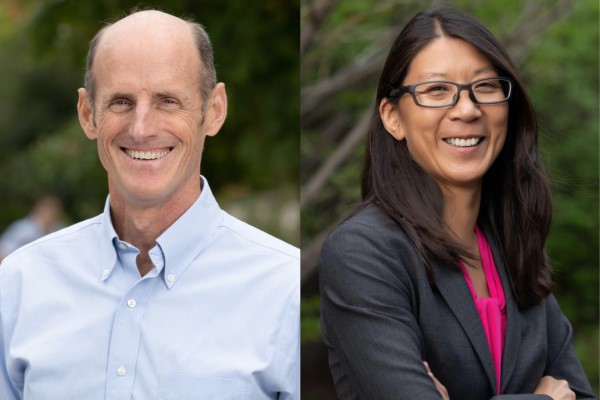 Global health experts have already begun planning for the next health emergency. What went right – and wrong – in handling the current crisis and how should those lessons shape future pandemic planning? Join the next Made by McGill alumni webcast as Moderator Derek Cassoff, Managing Director, Communications, McGill University Advancement, speaks with two of McGill’s leading global health practitioners: Dr. Tim Evans, Director of the School of Population and Global Health, and Dr. Joanne Liu, former International President of Médecins Sans Frontières and newly appointed McGill professor focusing on pandemic and health emergencies.
Global health experts have already begun planning for the next health emergency. What went right – and wrong – in handling the current crisis and how should those lessons shape future pandemic planning? Join the next Made by McGill alumni webcast as Moderator Derek Cassoff, Managing Director, Communications, McGill University Advancement, speaks with two of McGill’s leading global health practitioners: Dr. Tim Evans, Director of the School of Population and Global Health, and Dr. Joanne Liu, former International President of Médecins Sans Frontières and newly appointed McGill professor focusing on pandemic and health emergencies.
The McGill University School of Population and Global Health and the McGill Department of Family Medicine present:
The Global Primary Care Delivery Workshop Series
Workshop #5
Topic: "How can we improve equitable access to primary healthcare, especially in rural or remote communities? How can private-public partnerships improve primary healthcare? "
Wednesday, May 26, 2021, 12-1 PM EDT.
Readings:
Suggested Discussion Questions:
- Does private-sector collaboration benefit or threaten universal healthcare?
- What are barriers to effective referrals by primary healthcare providers?
Optional Discussion Questions
- What does an ideal interprofessional team look like in Canada? In countries with limited resources?
The McGill University School of Population and Global Health and the McGill Department of Family Medicine present:
The Global Primary Care Delivery Webinar Series
In January, the Department of Family Medicine launched a series of monthly workshops and invited speakers around the theme of Global Primary Care Delivery in collaboration with the School of Population and Global Health.
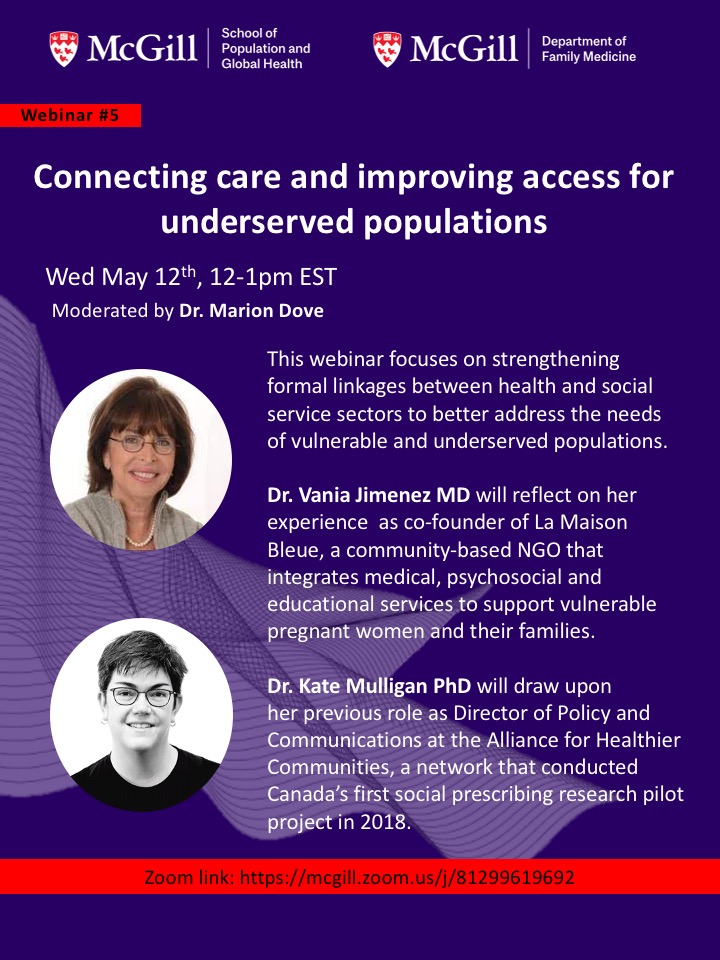 Session 5: Connecting care and improving access for vulnerable populations
Session 5: Connecting care and improving access for vulnerable populations
Wednesday, May 12, 2021, 12:00 to 1:00 p.m. EDT
Moderated by Dr. Marion Dove
Socioeconomic factors are known to be closely connected with good health. Primary care providers are uniquely positioned to holistically address these broader determinants of health by acting as a conduit between health and social services. In Canada, there is growing recognition that these linkages should be formalized within healthcare delivery to ensure high quality primary care.
This session will focus on two innovative models of primary care delivery.
Dr. Vania Jimenez will present the case of La Maison Bleue, a non-profit organization that combines the strengths of the health and social services network, represented by the Côte-des-Neiges Family Medicine Group (FMG) and the Integrated Health and Social Services University Network for West-Central Montreal (West-Central Montreal Health), and those of an independent non-profit organization (NPO) rooted in the community and closely tied to community partners. This atypical model provides a continuum of free public services to families and to marginalized and isolated communities.
Dr. Kate Mulligan will discuss a research pilot as part of her previous work with the Alliance for Healthier Communities, which connected UK experts in social prescribing with community health centres across Ontario. The project aimed to bring sustainable service innovation to the front lines of primary health care through directed mentorship, evidence-informed implementation, local adaptation and partnership, and built-in evaluation. This work emphasizes key aspects of Ontario’s healthcare reform, which is moving towards the integration of social prescribing link workers as part of its primary care teams.
Speaker Biographies
 Dr. Vania Jimenez MD is a researcher, clinician, obstetrician, psychotherapist and family physician practising in Montreal. In 1999, she was named the Canadian Family Physician of the Year by the College of Family Physicians of Canada. She is currently head of the Family Medicine Unit and head of Medical Services at CSSS Côte-des-Neiges in Montreal. Since 2006, she has served as president of La Maison Bleue, a non-profit organization staffed by family physicians who work in a multidisciplinary team to serve economically vulnerable families.
Dr. Vania Jimenez MD is a researcher, clinician, obstetrician, psychotherapist and family physician practising in Montreal. In 1999, she was named the Canadian Family Physician of the Year by the College of Family Physicians of Canada. She is currently head of the Family Medicine Unit and head of Medical Services at CSSS Côte-des-Neiges in Montreal. Since 2006, she has served as president of La Maison Bleue, a non-profit organization staffed by family physicians who work in a multidisciplinary team to serve economically vulnerable families.
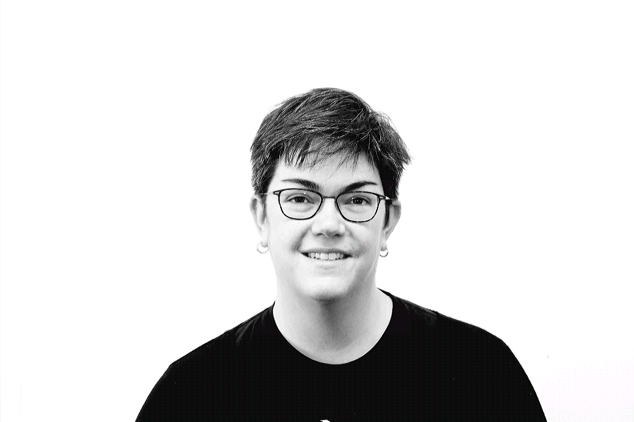 Dr. Kate Mulligan PhD is an assistant professor of social and behavioural sciences at U of T’s Dalla Lana School of Public Health. Mulligan previously served as Director of Policy and Communications at the Alliance for Healthier Communities, a network of community-governed primary health-care organizations. The network integrates prescriptions for social connection into existing health care and community services, which conducted Canada’s first social prescribing research pilot in 2018 dubbed Rx: Community.
Dr. Kate Mulligan PhD is an assistant professor of social and behavioural sciences at U of T’s Dalla Lana School of Public Health. Mulligan previously served as Director of Policy and Communications at the Alliance for Healthier Communities, a network of community-governed primary health-care organizations. The network integrates prescriptions for social connection into existing health care and community services, which conducted Canada’s first social prescribing research pilot in 2018 dubbed Rx: Community.
Special Seminar - Epidemiology and Biostatistics: some thought on the future
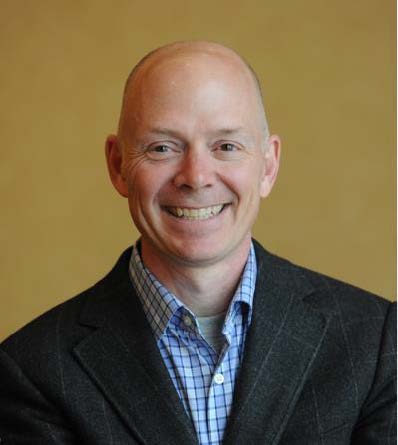 Dr. Robert Platt, Professor and Chair, Department of Epidemiology, Biostatistics, and Occupational Health, McGill University
Dr. Robert Platt, Professor and Chair, Department of Epidemiology, Biostatistics, and Occupational Health, McGill University
Thursday, May 6, 2021 – 11:30 AM EDT
Abstract: The visibility of epidemiology and biostatistics has exploded in the last few years. Last year, a New York Times column said, “Epidemiologists are the new rock stars”. Hal Varian, chief economist at Google, said in 2009 that “the sexy job in the next ten years will be statisticians”. I will first discuss some philosophy on the tension between methods development and substantive research in epidemiology and biostatistics, and then address three opportunities for growth. First, the COVID-19 pandemic has brought our field to the forefront like never before. It gives rise to opportunities for our fields, both in research and teaching. Second, the explosion of interest in data, and the development of data science and related fields has given rise to new research and training programs and substantial interest in existing programs. Our programs are leaders in their fields, but they need to grow and adapt to this changing environment. Finally, epidemiology and biostatistics are the bedrock of a strong school of public health, and our department is the cornerstone of the McGill School of Population and Global Health. I will discuss how we can lead, and help develop the School into a world leader across all of its domains.
Bio: Robert Platt is Professor and Chair of the Department of Epidemiology, Biostatistics, and Occupational Health at McGill University. He holds the Albert Boehringer I chair in Pharmacoepidemiology. Dr. Platt is the Executive Co-Lead and leader of the Methods team of the Canadian Network for Observational Drug Effect Studies. His research focuses on improving methods for the study of medications using administrative data, with an emphasis on methods for causal inference and a substantive focus on medications in pregnancy. Dr. Platt is an editor-in-chief of Statistics in Medicine and an editor of the American Journal of Epidemiology. He has published over 350 articles, one book and several book chapters on biostatistics and epidemiology.
Special Seminar - Spotlight on Epidemiology and Biostatistics: A glimpse into the future
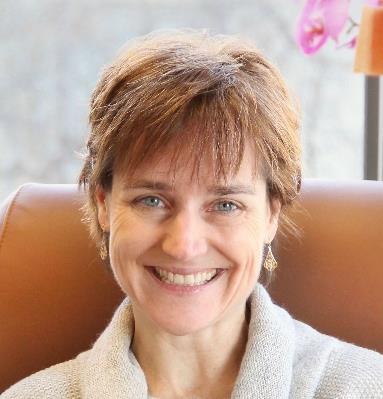 Josée Dupuis, Ph.D., Professor and Chair, Department of Biostatistics, Boston University School of Public Health
Josée Dupuis, Ph.D., Professor and Chair, Department of Biostatistics, Boston University School of Public Health
Wednesday, May 5, 2021 – 12:00 PM EDT
Abstract: The events of the past year have shed a spotlight on our fields of epidemiology and biostatistics. With a global pandemic, a climate crisis, and an increase in social/racial unrest, we are living a historical moment. In turn, these convergent challenges have led to increased visibility of epidemiology and biostatistics and offer opportunities. In this talk, I will highlight some of the opportunities that I feel should be capitalized on as we emerge from the pandemic and move forward towards a more diverse workplace and equitable society. I will also talk about longer-term views of our fields, where the impact of a large amount of non-research data are gathered in our everyday life creating tremendous opportunities to answer research questions, but also posing many challenges in terms of sound epidemiological and biostatistics methods to avoid biased and false conclusions. What we do with this new spotlight on epidemiology and biostatistics is up to us, and I am confident that we can rise to the challenge.
Bio: Josée Dupuis, Ph.D., is a Professor and Chair of Biostatistics at Boston University School of Public Health. She previously held a faculty position at Northwestern University and a senior statistical geneticist position at Genome Therapeutics Corporation, a small biotech company. She has extensive experience in the development and application of methods for genome-wide association studies, gene by environment interaction investigation, genetic meta-analysis, rare variant analysis, and omics data analysis, with special emphasis on the development of novel statistical approaches to analyze genetic data collected on large families. She is involved in the Framingham Heart Study and multiple international consortia, collaborating on projects to identify genes influencing diabetes related traits, pulmonary function traits, and Alzheimer Disease.
Professor Dupuis is a Fellow of the American Statistical Association (ASA), a Fellow of the American Association for the Advancement of Science (AAAS) and she is past-President of the International Genetic Epidemiology Society. She was recently honored with the International Genetic Epidemiology Leadership Award for her substantial contributions to the field and her service to the Society, and she received the 2020 American Society of Human Genetics Mentorship Award.
The McGill University School of Population and Global Health and the McGill Department of Family Medicine present:
The Global Primary Care Delivery Workshop Series
Workshop #4
Topic: "Delivering more equitable primary care: meeting communities where they’re at"
Wednesday, April 28th, 2021, 12-1 PM EDT.
This will be a special "fireside chat", audience-driven format where Dr. Anne Andermann (co-founder of an innovative community outreach clinic in Côte-des-Neiges that partners with Multicaf) will moderate discussions that capture snapshots of current clinical innovations in Montreal. She will be joined by Dr. Pierre-Paul Tellier and Dr. Juan Carlos Chirgwin, who will draw upon their work with LGBTQ+ and asylum-seeking populations respectively.
About our speakers:
Dr. Anne Andermann MD, is a public health physician and the founding director of the CLEAR Collaboration that aims to help frontline health workers address the underlying social causes of poor health through a combination of direct patient care, referral and advocacy for larger social change. She helped to establish an innovative community outreach clinic in Côte-des-Neiges with partners at Multicaf, a local food bank, to connect care to a family doctor at St Mary’s Hospital, and thereby access ongoing whole-person-care and a patient medical home.
Dr. Pierre-Paul Tellier MD, is an associate professor in Family Medicine at McGill University, in Montreal. Dr. Tellier is currently leading a project that implements the first-ever LGBTQ migrants (e.g. immigrants and refugees) and racialized community health clinic and peer navigator outreach program in Montreal. The goal is to increase access, improve continuity of care and address the health impacts of COVID-19 on this population. Integrated into a CLSC serving mostly migrants, this project brings together an interdisciplinary team of health care providers, peer navigators and LGBTQ migrant community organization, AGIR.
Dr. Juan Carlos Chirgwin MD is a family physician working who has been working at a community health clinic (CLSC) in the Montreal neighbourhood of the Park Extension since 2002. Many of the patients there are recently arrived immigrants and asylum seekers with significant language barriers, and the CLSC has used different ways of helping provide care across such barriers. He has advised the establishment of the Collaboration Interprofessionnelle Montréalaise Étudiante (CIME), an inter-professional team of medical, nursing, dietetics, and social work students sharing the common goal of diminishing healthcare gaps experienced by asylum seekers in Montréal.
Upcoming workshops (12:00 PM -1:00 PM EDT):
- Wednesday, May 26th, 2021
- Wednesday, June 9th, 2021
The Global Primary Care Delivery Webinar Series
In January, the Department of Family Medicine launched a series of monthly workshops and invited speakers around the theme of Global Primary Care Delivery in collaboration with the School of Population and Global Health
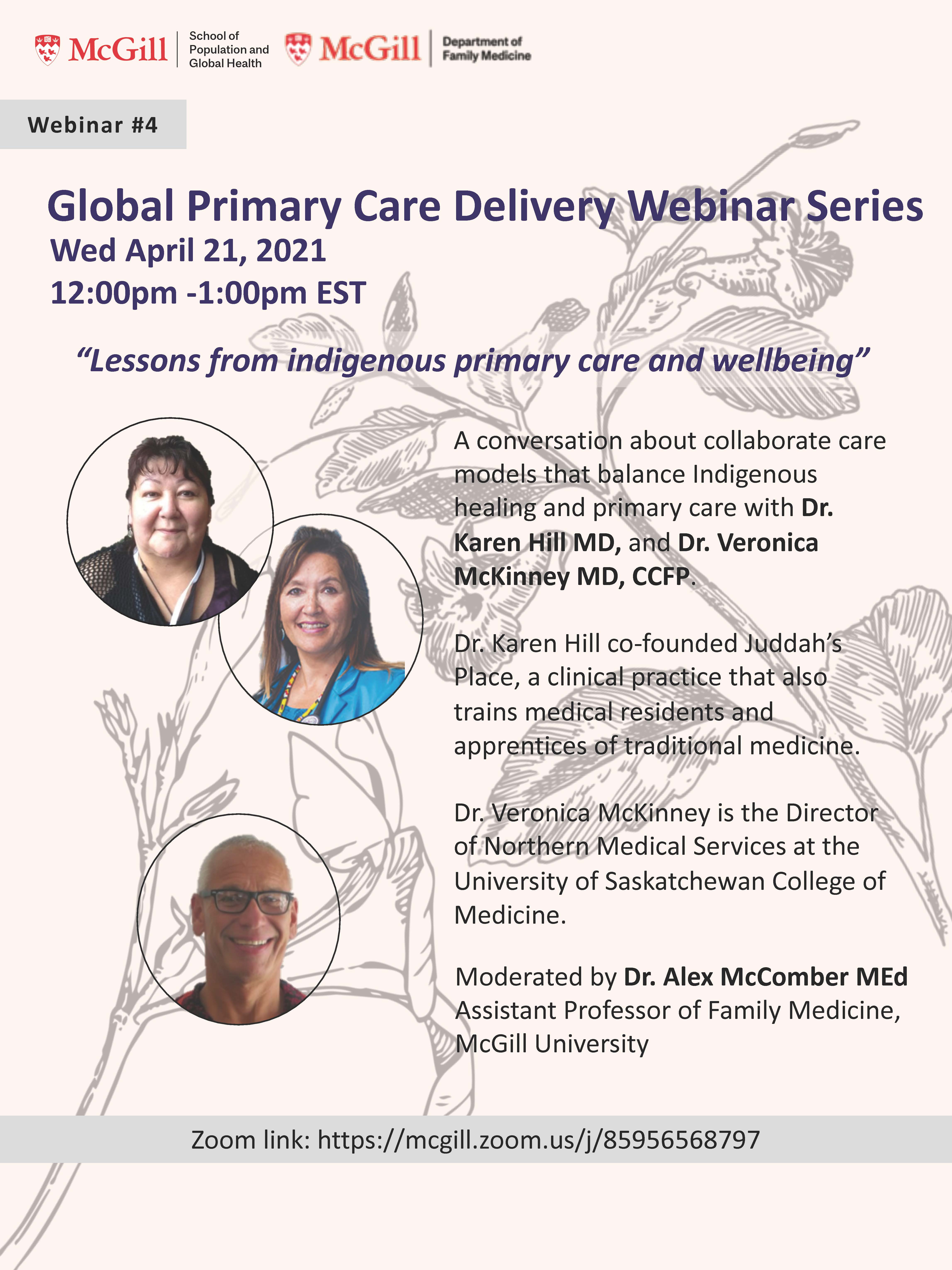 Session 4: Perspectives on Indigenous primary care and wellbeing
Session 4: Perspectives on Indigenous primary care and wellbeing
Wednesday, April 21, 2021, 12:00 to 1:00 p.m. EDT
Moderated by Dr. Alex McComber, this session will be an informal conversation about collaborative care models that balance Indigenous healing and primary care with Dr. Karen Hill and Dr. Veronica McKinney. Dr. Karen Hill co-founded Juddah’s Place, a clinical practice that also trains medical residents and apprentices of traditional medicine. Dr. Veronica McKinney is the Director of Northern Medical Services at the University of Saskatchewan College of Medicine.
The Global Primary Care Delivery Workshop Series
The next event in the Global Primary Care Workshop Series will happen on Wednesday, March 31st, 2021 from 12 PM to 1 PM (EDT). Participants will explore the following question in both large and small groups:
- In what ways should we deploy our healthcare workforce to better respond to the control of non-communicable diseases?
The McGill Epidemiology, Biostatistics and Occupational Health Student Society (EBOSS) and the McGill School of Population and Global Health Present:
How to be Anti-Racist in Your Scholarship and Teaching
Monday, March 29, 2021, 4:00 – 5:30 PM EDT
McGill has taken many steps towards providing a framework for what it means to be anti-racist and students at the School of Population and Global Health are hosting an event in solidarity with this commitment.
The format will be a panel discussion between five speakers with varying interdisciplinary backgrounds in health, including both professors and students. The event has a two-fold aim 1) to understand racialized persons' lived experiences in their respective fields and 2) to identify solutions and recommendations to make a difference now and onward.
Speakers
- Dr. Akwatu Khenti, Assistant Professor, Dalla Lana School of Public Health, University of Toronto
- Dr. Debra Thompson, Associate Professor, Department of Political Science, McGill University
- Alex McComber, Assistant Professor, Department of Family Medicine, McGill University
- Jo-Ann Osei-Twum, Co-founder, Black Public Health Collective
- Kabisha Velauthapillai, MD Candidate, University of Toronto
- Moderator: Tuviere Onookome-Okome
Zoom Link | tammy.bui [at] mail.mcgill.ca (subject: March%2029%20Anti-Racism%20event) (Questions)
The McGill University School of Population and Global Health and the McGill Department of Family Medicine present:
The Global Primary Care Delivery Webinar Series
In January, the Department of Family Medicine launched a series of monthly workshops and invited speakers around the theme of Global Primary Care Delivery in collaboration with the School of Population and Global Health.
Session 3: New models of patient-oriented primary care
 Wednesday, March 17, from 12:00 to 1:00 p.m. EDT
Wednesday, March 17, from 12:00 to 1:00 p.m. EDT
Moderated by Dr. Timothy Evans.
This webinar convened perspectives from the USA and UK regarding virtual expert care and other mechanisms to facilitate patient self-management and decision-making.
Speakers:
- Dr. Deneen Vojta, UnitedHealthcare Group (USA), Executive Vice President, Global Research & Development
- Dr. Al Mulley, Director and Professor at The Dartmouth Institute; Former Fellow, The Kings Fund (UK)
- Margaret Mulley, Former Partner, Deloitte & Touche, LLP, Lecturer, Tuck School of Business, Dartmouth College
Session 2: Innovations in extending the delivery of community-based primary care
 The next Speaker Series webinar took place on Wednesday, February 17, 2021, from 12:00 to 1:00 PM, followed by a Workshop Series on Wednesday, February 24, 2021, from 12:00 to 1:00 PM.
The next Speaker Series webinar took place on Wednesday, February 17, 2021, from 12:00 to 1:00 PM, followed by a Workshop Series on Wednesday, February 24, 2021, from 12:00 to 1:00 PM.
The Speaker Series will highlight innovative approaches to the delivery of primary care in both local and global settings, including perspectives from industry, non-profit, and indigenous partners.
We are delighted to hear from two leaders of organizations that are trailblazing in the area of primary care delivery. Our first speaker, Rubayat Khan is a social entrepreneur from Bangladesh who is currently CEO of Jeeon, a social business that digitizes and upgrades retail pharmacies in rural settings, and connects them with doctors and hospitals in order to bridge the gap between underserved patients and quality healthcare.
Next, we have Nan Chen, from Last Mile Health, an organization that works to improve access to—and the quality of—essential healthcare for people living in rural and remote communities through teams of community and frontline health workers.
Moderated by Dr. Timothy Evans, their talk “Innovations in extending the delivery of community-based primary care” will feature Rubayat’s perspectives about partnering with the private and public sector to strengthen community health systems. Nan will draw upon his expertise to discuss the payment of community health workers as a critical systems innovation using examples from work in Liberia.
Rubayat Khan, MPA/ID
 Rubayat Khan is a serial social entrepreneur, development practitioner and data scientist from Bangladesh specialized in the innovative use of low-cost technologies to solve important global development challenges. Rubayat co-founded mPower Social Enterprises in 2008, an organization working at the cutting edge of ICT4D and M4D (Mobile for Development), and has in that capacity built award winning models and projects with organizations like BRAC and Save the Children in Asia, Africa and Central America. He has since co-founded and is CEO of mDoc LLC, which aims to take quality primary healthcare to the next 2 billion people in the world. In the past, he has worked as a consultant for the Gross National Happiness Commission in Bhutan, and for a data science firm in Silicon Valley called Kaggle. Currently, Rubayat runs Jeeon, a startup trying to leverage technology to upgrade rural drug sellers – the primary source of healthcare for most rural Bangladeshis – into high quality primary healthcare providers. He graduated with an MPA/ID from Harvard Kennedy School, and was awarded the Raymond Vernon Award for being the graduating student who best personifies the values of the program. He is also an Unreasonable Institute Fellow.
Rubayat Khan is a serial social entrepreneur, development practitioner and data scientist from Bangladesh specialized in the innovative use of low-cost technologies to solve important global development challenges. Rubayat co-founded mPower Social Enterprises in 2008, an organization working at the cutting edge of ICT4D and M4D (Mobile for Development), and has in that capacity built award winning models and projects with organizations like BRAC and Save the Children in Asia, Africa and Central America. He has since co-founded and is CEO of mDoc LLC, which aims to take quality primary healthcare to the next 2 billion people in the world. In the past, he has worked as a consultant for the Gross National Happiness Commission in Bhutan, and for a data science firm in Silicon Valley called Kaggle. Currently, Rubayat runs Jeeon, a startup trying to leverage technology to upgrade rural drug sellers – the primary source of healthcare for most rural Bangladeshis – into high quality primary healthcare providers. He graduated with an MPA/ID from Harvard Kennedy School, and was awarded the Raymond Vernon Award for being the graduating student who best personifies the values of the program. He is also an Unreasonable Institute Fellow.
Nan Chen, MPP, JD, BA
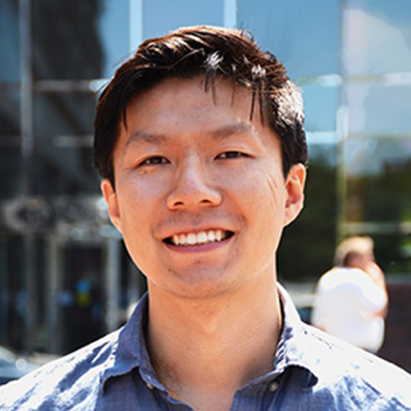 Nan Chen is the Managing Director of Health Systems at Last Mile Health, a nonprofit organization that designs and builds community-based primary health systems. Nan supports the organization’s global work to understand what works and why in community health program scale. He also works to diffuse those lessons via partnerships and advocacy for community health systems in collaboration with peer organizations to support countries strengthen their community health systems. Nan’s team supports the organization’s core work in Liberia around the design, launch, and scale of a national community health program in partnership with the Ministry of Health. Nan is currently on the Financing Alliance for Health’s Project Advisory Committee. Prior to Last Mile Health, Nan worked with the Millennium Challenge Corporation on private public partnerships, policy analysis, and nutrition/stunting interventions. Additionally, Nan worked with Open Capital Advisors in Kenya assisting impact investors in scaling social enterprises. Nan has also advised NGOs and social enterprises through the Harvard Law and International Development Society and Aspen Network for Development Entrepreneurs. Nan has an MPP from the Harvard Kennedy School, JD from Northwestern University, and BA from University of Chicago.
Nan Chen is the Managing Director of Health Systems at Last Mile Health, a nonprofit organization that designs and builds community-based primary health systems. Nan supports the organization’s global work to understand what works and why in community health program scale. He also works to diffuse those lessons via partnerships and advocacy for community health systems in collaboration with peer organizations to support countries strengthen their community health systems. Nan’s team supports the organization’s core work in Liberia around the design, launch, and scale of a national community health program in partnership with the Ministry of Health. Nan is currently on the Financing Alliance for Health’s Project Advisory Committee. Prior to Last Mile Health, Nan worked with the Millennium Challenge Corporation on private public partnerships, policy analysis, and nutrition/stunting interventions. Additionally, Nan worked with Open Capital Advisors in Kenya assisting impact investors in scaling social enterprises. Nan has also advised NGOs and social enterprises through the Harvard Law and International Development Society and Aspen Network for Development Entrepreneurs. Nan has an MPP from the Harvard Kennedy School, JD from Northwestern University, and BA from University of Chicago.
Note that the second session for the parallel Workshop Series took place on Wednesday, February 24th, 2021 at 12 PM to 1 PM (EST).
Faculty, students, and clinicians will be able to investigate these topics in greater depth through the Workshop series. In these workshops, participants will reflect on short readings related to primary care delivery in the areas of mental health and non-communicable diseases, and innovative approaches to ensuring equitable and responsive services across the life-course. Through these workshops, we hope to identify areas of collaborative research and training worth pursuing.
Please send an email to briana.cheng2 [at] mail.mcgill.ca or alayne.adams [at] mcgill.ca if you are interested in attending the Workshop Series and/or are interested in facilitating one of the discussions.
Special Seminar - Preventing and responding to violence in the 21st century: A critical global mental health research agenda
Dr. Rochelle Frounfelker, Postdoctoral Fellow, Division of Social and Cultural Psychiatry, Department of Psychiatry, McGill University
Thursday, February 4, 2021 – 11:30 AM
Abstract: Dr. Frounfelker’s presentation, “Preventing and responding to violence in the 21st century: A critical global mental health research agenda,” argues for the need to study violence and trauma as social, cultural, and psychological phenomena both locally and globally. Rochelle will outline her research plans in two domains of violence and mental health - mental health of war-affected populations and the global phenomena of violent radicalization.
 Bio: Rochelle Frounfelker is a postdoctoral fellow in the Department of Psychiatry at McGill University. She obtained her doctorate in social and behavioral sciences from the Harvard T.H. Chan School of Public Health, and her masters in public health and social work from Columbia University in New York City. Rochelle has a primary interest in investigating the life course impact of trauma and violence on psychiatric disorders. She has almost 20 years of experience in the field, including as a clinician for survivors of sexual violence, partner and ally of war-affected communities, and mental health services researcher. Her work is interdisciplinary and incorporates knowledge from the fields of social epidemiology, child development, aging, and cultural psychiatry.
Bio: Rochelle Frounfelker is a postdoctoral fellow in the Department of Psychiatry at McGill University. She obtained her doctorate in social and behavioral sciences from the Harvard T.H. Chan School of Public Health, and her masters in public health and social work from Columbia University in New York City. Rochelle has a primary interest in investigating the life course impact of trauma and violence on psychiatric disorders. She has almost 20 years of experience in the field, including as a clinician for survivors of sexual violence, partner and ally of war-affected communities, and mental health services researcher. Her work is interdisciplinary and incorporates knowledge from the fields of social epidemiology, child development, aging, and cultural psychiatry.
Special Seminar - Public health in transit – a global political priority
Dr. Danielle N. Poole, Postdoctoral Fellow, Neukom Institute for Computational Science, Department of Geography, Geisel School of Medicine, Dartmouth College
Thursday, January 28, 2021 – 12:00 PM
Abstract: Over 80 million people are currently displaced by humanitarian crises. Moreover, the number of forcibly displaced persons is expected to increase due to the changing nature of conflict and compounding effects of climate change, making health in humanitarian crises a global political priority. We know about the health of forced migrants upon arrival in their destination countries, and we may know some about the health of populations before a conflict or disaster invokes mass displacement. However, there is a gap in our understanding of forced migrant health during the transit phase of migration. And yet, time in transit is becoming more important as displaced populations face increasingly hazardous routes and asylum-seeking processes are protracted. In this seminar, I will investigate the dynamic interactions of individual, social, structural, and “place” determinants of mental health in humanitarian crises.
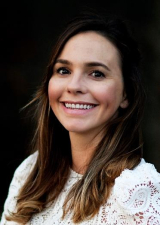 Bio: Dr. Danielle (Dani) Poole is a population health scientist focused on improving health in humanitarian crises. Within the broader field of humanitarian health research, her work is centered around two themes: 1) measuring health disparities, with a substantive focus on mental health, and 2) developing novel research methods for complex settings. To address these lines of inquiry, she applies methodological approaches spanning the epidemiological, geospatial, and statistical sciences. She collaborates with colleagues in Canada, Greece, Italy, Kenya, The Netherlands, Nigeria, South Africa, South Sudan, Turkey, and the US, among other countries.
Bio: Dr. Danielle (Dani) Poole is a population health scientist focused on improving health in humanitarian crises. Within the broader field of humanitarian health research, her work is centered around two themes: 1) measuring health disparities, with a substantive focus on mental health, and 2) developing novel research methods for complex settings. To address these lines of inquiry, she applies methodological approaches spanning the epidemiological, geospatial, and statistical sciences. She collaborates with colleagues in Canada, Greece, Italy, Kenya, The Netherlands, Nigeria, South Africa, South Sudan, Turkey, and the US, among other countries.
Special Seminar - Improving mental health in the context of humanitarian crises and climate change: Bridging the gap between research and practice
Dr. Jura Augustinavicius, Assistant Scientist (Research Faculty) Department of Mental Health, Johns Hopkins Bloomberg School of Public Health
Tuesday, January 26, 2021 – 11:00 AM
Abstract: Populations living in humanitarian settings and those most heavily impacted by the climate crisis are at increased risk of poor mental health and psychosocial well-being. This seminar will introduce these issues and will explore opportunities for intervention through study specific examples. The seminar will focus on research supporting adaptation, implementation, and evaluation of mental health and psychosocial support interventions as well as interventions from other sectors in diverse humanitarian and climate change affected contexts. Future directions at the intersection of mental health in humanitarian settings and climate change and mental health will be explored and opportunities for research and practice will be highlighted.
 Bio: Jura Augustinavicius is an Assistant Scientist (Research Faculty) at the Johns Hopkins Bloomberg School of Public Health. Dr. Augustinavicius also serves as affiliated faculty at the Johns Hopkins Center for Humanitarian Health and as a Research Advisor and Lead on climate change and youth engagement at the MHPSS Collaborative hosted by Save the Children Denmark. She completed a doctorate and postdoctoral fellowship in the Department of Mental Health at the Johns Hopkins Bloomberg School of Public Health with special training in applied psychiatric epidemiology and mixed-methods approaches for use in mental health research and practice. Dr. Augustinavicius’ research focuses on mental health assessment and intervention among populations exposed to adversity in low-resource humanitarian settings and in the context of climate change. Specifically, she has worked on mental health program development and evaluation among conflict-affected populations, building research-practice collaborations to support mental health measurement and intervention in humanitarian settings, and understanding mental health in the context of climate change to inform program and policy implementation.
Bio: Jura Augustinavicius is an Assistant Scientist (Research Faculty) at the Johns Hopkins Bloomberg School of Public Health. Dr. Augustinavicius also serves as affiliated faculty at the Johns Hopkins Center for Humanitarian Health and as a Research Advisor and Lead on climate change and youth engagement at the MHPSS Collaborative hosted by Save the Children Denmark. She completed a doctorate and postdoctoral fellowship in the Department of Mental Health at the Johns Hopkins Bloomberg School of Public Health with special training in applied psychiatric epidemiology and mixed-methods approaches for use in mental health research and practice. Dr. Augustinavicius’ research focuses on mental health assessment and intervention among populations exposed to adversity in low-resource humanitarian settings and in the context of climate change. Specifically, she has worked on mental health program development and evaluation among conflict-affected populations, building research-practice collaborations to support mental health measurement and intervention in humanitarian settings, and understanding mental health in the context of climate change to inform program and policy implementation.
The McGill University School of Population and Global Health and the McGill Department of Family Medicine present:
The Global Primary Care Delivery Webinar Series
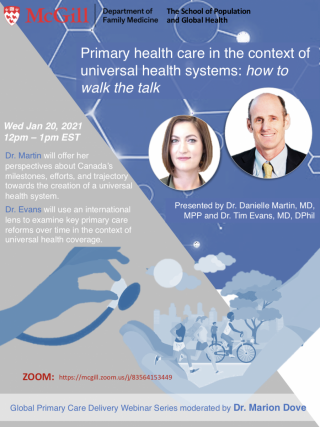 Session 1: “Primary health care in the context of universal health systems: how to walk the talk”
Session 1: “Primary health care in the context of universal health systems: how to walk the talk”
Wednesday, January 20th, 2021 from 12 PM to 1 PM (EST)
Speakers: Dr. Danielle Martin and Dr. Timothy Evans
Moderator: Dr. Marion Dove
The first session of this six-part monthly series had two highly esteemed experts – Dr. Danielle Martin and Dr. Timothy Evans – join forces to deliver a greatly anticipated talk about the future vision of primary healthcare in local and global settings. Moderated by Dr. Marion Dove, their talk will feature Dr. Martin’s perspectives about Canada’s milestones, efforts, and trajectory towards the creation of a universal health system. Next, Dr. Evans will use an international lens to examine key primary care reforms over time in the context of universal health coverage. We look forward to seeing you at this speaker series that promises to be exciting and provoking.
Watch the Recording
In parallel to the Webinar Series, don't miss the Global Primary Care Delivery Workshop Series. The first session took place on Wednesday, January 27th, 2021 from 12 PM to 1 PM (EST).
Dr. Tim Evans
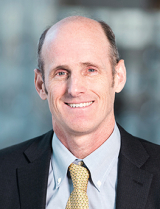 Tim Evans has been at the forefront of advancing global health equity and strengthening health systems delivery for more than 20 years. His creative energies led to the Commission on the Social Determinants of Health, the development of numerous global partnerships such as the Global Alliance on Vaccines and Immunization (GAVI), the Global Financing Facility (GFF) for Women, Children and Adolescents, and the creation of a novel hub and spoke approach to training community midwives in Bangladesh. At McGill, he wears many hats. He is the Inaugural Director and Associate Dean of the School of Population and Global Health (SPGH) in the Faculty of Medicine, Associate Vice-Principal for Global Policy and Innovation, and Executive Director of Canada’s COVID-19 Immunity Task Force. Tim has held multiple global leadership positions, including appointments as Senior Director of the Health, Nutrition and Population Global Practice at the World Bank Group, Dean of the James P. Grant School of Public Health at BRAC University in Dhaka, Bangladesh, and Assistant Director General at the World Health Organization. Tim earned his D.Phil. in Agricultural Economics from the University of Oxford, where he was a Rhodes Scholar, followed by medical and residency training at McMaster and Harvard Universities, respectively.
Tim Evans has been at the forefront of advancing global health equity and strengthening health systems delivery for more than 20 years. His creative energies led to the Commission on the Social Determinants of Health, the development of numerous global partnerships such as the Global Alliance on Vaccines and Immunization (GAVI), the Global Financing Facility (GFF) for Women, Children and Adolescents, and the creation of a novel hub and spoke approach to training community midwives in Bangladesh. At McGill, he wears many hats. He is the Inaugural Director and Associate Dean of the School of Population and Global Health (SPGH) in the Faculty of Medicine, Associate Vice-Principal for Global Policy and Innovation, and Executive Director of Canada’s COVID-19 Immunity Task Force. Tim has held multiple global leadership positions, including appointments as Senior Director of the Health, Nutrition and Population Global Practice at the World Bank Group, Dean of the James P. Grant School of Public Health at BRAC University in Dhaka, Bangladesh, and Assistant Director General at the World Health Organization. Tim earned his D.Phil. in Agricultural Economics from the University of Oxford, where he was a Rhodes Scholar, followed by medical and residency training at McMaster and Harvard Universities, respectively.
Dr. Danielle Martin
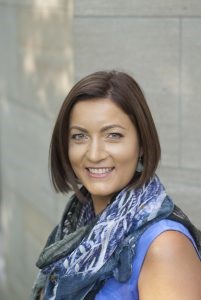 Danielle Martin is a family physician and Associate Professor in the Department of Family and Community Medicine and the Institute of Health Policy, Management and Evaluation at the University of Toronto. She practices in the Family Practice Health Centre at Women’s College Hospital (WCH) where she is also the Vice-President Medical Affairs & Health System Solutions. Danielle’s policy expertise and passion for equity
Danielle Martin is a family physician and Associate Professor in the Department of Family and Community Medicine and the Institute of Health Policy, Management and Evaluation at the University of Toronto. She practices in the Family Practice Health Centre at Women’s College Hospital (WCH) where she is also the Vice-President Medical Affairs & Health System Solutions. Danielle’s policy expertise and passion for equity
McGill Alumni Webcast: Your pressing COVID-19 questions answered
December 15, 2020, 12-1 PM
Dr. Marcel Behr, Co-Director, McGill Interdisciplinary Initiative in Infection and Immunity (Mi4) and Interim Director of McGill Infectious Diseases Division
Dr. Timothy Evans, Inaugural Director and Associate Dean of the School of Population and Global Health, Faculty of Medicine
Watch now
Free online course
Policy perspectives on pandemic preparedness and response - What are we learning from COVID-19?
![]() leadership_poster_series_-_timothy-robert-shan-v3.pdf
leadership_poster_series_-_timothy-robert-shan-v3.pdf
2019-2020 events
Special Lecture - Dr. Pamela Roach
Indigenous Health Research: Enhancing Equity Across Populations & Health Services
July 6th, 2020 - 1PM
Zoom link to join: https://us02web.zoom.us/j/81138920443

COVID-19 and the world’s vulnerable communities – a live webcast
April 30th, 2020 - 12PM
Event Description:
How is the COVID-19 pandemic affecting developing countries around the world? Are frontline health workers equipped to deal with the crisis? What are the most constructive approaches to an effective global response? How does international aid play an effective role now – and in a post-COVID-19 world?
Join us for a special webcast in partnership with McGill’s Alumni Association featuring a panel of international health experts and get the perspectives of leaders from the frontlines as well as development institutions like the World Bank.
With:
- Dr. Agnes Binagwaho, Vice Chancellor at the University of Global Health Equity, Senior Advisor to the World Health Organization Director General, Senior Lecturer at Harvard Medical School.
- Dr. Ariel Pablos-Méndez, Professor of Medicine at Columbia University Medical Center, former Assistant Administrator for Global Health at USAID.
- Mr. Patricio V. Marquez, Senior Consultant for the preparation of Global Emergency Response to Covid-19 at the World Bank Group (WBG), Senior Associate at the Johns Hopkins University Bloomberg School of Public Health, Member of the External Advisory Group for the Global Mental Health Program at the University of Washington. Former Lead Health Specialist at WBG.
- Dr. Raj Panjabi, CEO of Last Mile Health and Assistant Professor of Medicine at Harvard Medical School and the Division of Global Health Equity at Brigham & Women’s Hospital.
- Dr. Joanne Liu, MDCM’91, IMHL’14, Associate Professor of Medicine at the University of Montreal, Professor of Clinical Medicine at McGill, former International President of Médecins Sans Frontières.
Moderators: Dr. Timothy Evans, Inaugural Director and Associate Dean of the School of Population and Global Health, Faculty of Medicine, McGill, and Derek Cassoff, Managing Director, Communications, McGill Advancement.
Link to join: https://youtu.be/PngELRwJepw
SPGH Strategic Planning Townhall
April 15th, 2020 - 12PM
Event Description:
The SPGH will be hosting a virtual town hall on Wednesday April 15, 2020 from 12-1PM.
Click here to join.

Confronting COVID-19: a special webcast with McGill health experts
March 19, 2020 - 12 PM
Dr. Marcel Behr, Co-Director, McGill Interdisciplinary Initiative in Infection and Immunity (Mi4) and Interim Director of McGill Infectious Diseases Division
Dr. Timothy Evans, Inaugural Director and Associate Dean of the School of Population and Global Health, Faculty of Medicine
